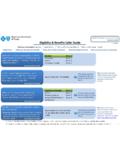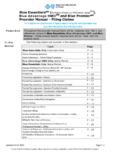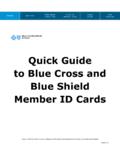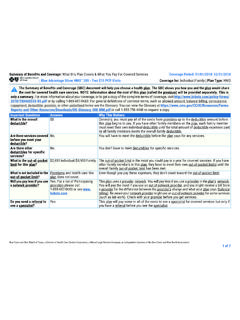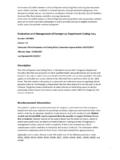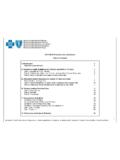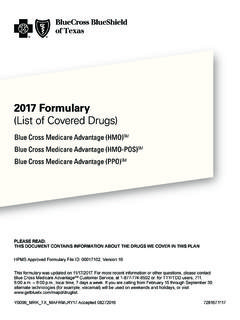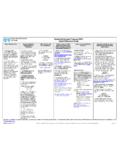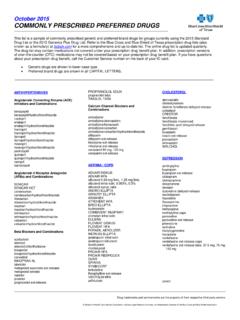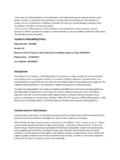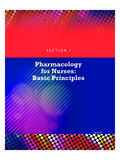Transcription of CLINICAL PRACTICE GUIDELINE FOR CONGESTIVE HEART …
1 08/03 A Division of Health Care Service Corporation, a Mutual Legal Reserve Company, an Independent Licensee of the Blue Cross and Blue Shield Association CLINICAL PRACTICE Guidelines (CPG) for CONGESTIVE HEART Failure (CHF) This CLINICAL PRACTICE GUIDELINE (CPG) for CONGESTIVE HEART Failure (CHF) is based on the Agency for Health Care Policy and Research CLINICAL PRACTICE GUIDELINE No. 11, HEART Failure Evaluation and Care of Patients with Left Ventricular Systolic Dysfunction. It incorporates recently published recommendations from the American College of Cardiology/American HEART Association Task Force on PRACTICE Guidelines (JACC-Vol. 38, Nov.)
2 7, 2001). This CPG is not intended to replace your CLINICAL medical judgment. A physician's medical decisions should be based on current medical knowledge and practices, taking into consideration the CLINICAL circumstances of each individual patient. Goals To provide guidelines for: Early and ongoing control of CONGESTIVE HEART failure symptoms through lifestyle management and pharmacotherapy to reduce complications, improve outcomes and life expectancy Preserving the left ventricular myocardium Achieving optimal pharmacotherapy with minimal or no side effects Minimizing the need for acute services (ER encounters, urgent care and hospitalizations) Assessment and Diagnos Complaints of paroxysmal nocturnal dyspnea, orthopnea or new-onset dyspnea on exertion History and physical examination to include chest X-ray, electrocardiogram (ECG), complete blood count (CBC)
3 , serum electrolytes, serum creatinine, serum albumin, liver function tests and urinalysis Echocardiography or radionuclide ventriculography to measure left ventricular ejection fraction (< 35% to 40%) T4 and thyroid-stimulating hormone (TSH) level for patients > 65 years of age, or who have atrial fibrillation or evidence of thyroid disease For Stages of CHF, see Table 1, excerpted from the report of the American College of Cardiology/American HEART Association Task Force on PRACTICE Guidelines (JACC-Vol. 38, Nov. 7, 2001, pages 2102-2103). _____ CLINICAL PRACTICE GUIDELINE for CHF Revised August 2003 Page 2 08/03 Therapy Routine Outpatient Management Daily weight recording/monitoring.
4 Instruct the member when to call the physician for unexplained weight gain of greater than three to five pounds, unless a lower range is prescribed Daily fluid intake monitoring Low sodium diet Prescribed exercise program Smoking cessation Alcohol restriction Annual influenza vaccine Pneumococcal vaccine (generally once in a lifetime) Medications commonly used Thiazide diuretics, loop diuretics, Potassium-sparing diuretics or Thiazide-related diuretics ACE inhibitors Beta Blockers Digoxin Hydralazine Isosorbide Dinitrate _____ Hospital Management May be indicated if the following findings are present: CLINICAL or electrocardiographic evidence of acute myocardial ischemia Pulmonary edema or severe respiratory distress Oxygen saturation below 90% (not due to pulmonary disease) Stage AAt high risk for heartfailure but withoutstructural heartdisease or symptomsof HFStage BStructural heartdisease but withoutsymptoms of HFStage CStructural HEART diseasewith prior or currentsymptoms of HFStage DRefractory HFrequiring , Patients with.
5 Yhypertensionycoronary arterydiseaseydiabetes mellitusorPatientsyusingcardiotoxinsywit h FHx , Patients whohave markedsymptoms at restdespite maximalmedical therapy( , those who arerecurrentlyhospitalized orcannot be safelydischarged from thehospital withoutspecializedinterventions) , Patients with:yknown structuralheart diseaseyshortness ofbreath andfatigue, , Patients with:yprevious MIyLV systolicdysfunctionyasymptomaticvalvular diseaseTHERAPYyTreat hypertensionyEncourage smokingcessationyTreat lipid disordersyEncourage regularexerciseyDiscourage alcoholintake, illicit drug useyACE inhibition inappropriate patients(see text)THERAPYyAll measures underStage A, B, and CyMechanical assistdevicesyHeart transplantationyContinuous (notintermittent) IVinotropic infusions forpalliationyHospice careTHERAPYyAll measuresunder Stage AyDrugs for routineuse.
6 DiureticsACE inhibitorsBeta-blockersDigitalisyDietary saltrestrictionTHERAPYyAll measuresunder Stage AyACE inhibitors inappropriatepatients (seetext)yBeta-blockers inappropriatepatients (seetext)Developmentof symptomsof HFStructureheart diseaseRefractorysymptoms ofHF at riskClinical PRACTICE GUIDELINE for CHF Revised August 2003 Page 3 08/03 Severe complicating medical illness ( , pneumonia) Anasarca Symptomatic hypotension or syncope Persistent NYHA Class 3 or 4 despite maximal outpatient therapy Post hospital patient contact should be within one week following discharge to ensure patient understanding and compliance with treatment plan.
7 Patient Education General Counseling Explanation of HEART failure and the reason for symptoms Cause or probable cause of HEART failure Expected symptoms Symptoms of worsening HEART failure What to do if symptoms worsen Self-monitoring of daily weights Explanation of treatment/plan of care Clarification of patient's responsibilities Importance of cessation of tobacco use Role of family members or other caregivers in the treatment/plan of care Availability and value of qualified local support group Importance of obtaining vaccinations against influenza and pneumococcal disease Importance of compliance with the treatment/plan of care Prognosis Life expectancy Advance directives Advice for family members in the event of sudden death Activity Recommendations Recreation, leisure and work activity Exercise Sexual activity and coping strategies Dietary Recommendations Sodium restriction Avoidance of excessive fluid intake Fluid restriction.
8 If required Alcohol restriction Medications Effects of medications on quality of life and survival Dosing Likely side effects and what to do if they occur Coping mechanisms for complicated medical regimens Availability of lower cost medications or financial assistance Specialist Involvement Specialist involvement may be indicated when the following findings are present: CLINICAL PRACTICE GUIDELINE for CHF Revised August 2003 Page 4 08/03 Intolerance of ACE inhibitors Atrial or ventricular arrhythmias Suspicion of correctable cause of HEART failure (ischemia, valve disease) Diastolic dysfunction Difficulty achieving or maintaining control of symptoms _____
